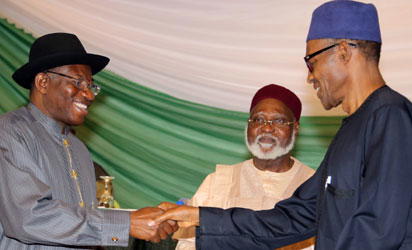Former Nigerian President Goodluck Jonathan has opened up about the emotional turmoil he experienced following his unprecedented electoral defeat in 2015. Speaking at the inaugural Raymond Dokpesi Annual Diamond Lecture, Jonathan painted a vivid picture of a leader grappling with one of the most challenging moments in his political journey.
The historic election of 2015 marked a watershed moment in Nigerian politics, as Jonathan became the first incumbent president in the nation’s history to concede defeat in a democratic election. The numbers told a clear story: Muhammadu Buhari of the All Progressives Congress secured victory with 15,424,921 votes, while Jonathan, representing the Peoples Democratic Party, garnered 12,853,162 votes.
“It is not easy to lose an election as a president,” Jonathan confessed to the audience, his characteristic smile masking the depth of emotion in his words. You will think the whole world is against you.” This candid admission from a former head of state offers a unique perspective on the human side of political leadership, revealing the vulnerability that lies beneath the veneer of power.
The former president’s revelations came during an event organized jointly by Daar Communications and the Nigerian Institute of Public Relations, where he shared insights into the crucial role played by Raymond Dokpesi, Chairman of Daar Communications, during the sensitive transition period. Jonathan particularly emphasized how Dokpesi’s support and wisdom helped him navigate the turbulent waters of political defeat.
In what could be described as a masterclass in graceful defeat, Jonathan’s account highlighted the importance of mentorship and guidance during times of political upheaval. While numerous elder statesmen reached out to him during this period, it was Dokpesi’s particular approach – combining congratulations with encouragement to look beyond the immediate disappointment – that left an indelible mark on the former president’s psyche.
After I listened to all the conversations, he congratulated me and encouraged me to look beyond the election,” Jonathan recalled, emphasizing how this interaction provided him with not just immediate solace but also long-term spiritual strength as he transitioned into private citizenship. The former president referenced his book, “My Transition Hours,” where he provides a more detailed account of these experiences.
The significance of Jonathan’s reflection extends beyond personal narrative. It serves as a powerful reminder of the importance of democratic principles and peaceful transitions of power in African politics. His decision to concede defeat and facilitate a smooth transfer of power set a precedent that continues to influence political discourse across the continent.
The former president’s willingness to share his vulnerable moments demonstrates a remarkable evolution in Nigerian political culture, where leaders traditionally maintain a stoic facade regardless of circumstances. By openly discussing his emotional journey, Jonathan has contributed to humanizing political leadership and fostering a more empathetic understanding of the psychological toll of political service.
This revelation also underscores the crucial role of support systems and mentorship in political life. The interaction between Jonathan and Dokpesi illustrates how personal relationships and wise counsel can help leaders navigate the complex emotional landscape of political transitions.
As Nigeria continues to evolve democratically, Jonathan’s reflections serve as both a historical marker and a lesson in political maturity. His experience demonstrates that while electoral defeat may feel like a personal rejection, it is ultimately a testament to the strength of democratic institutions and the importance of accepting the will of the people.
Through his candid sharing, Jonathan has not only added a valuable chapter to Nigeria’s political history but has also provided important insights into the personal costs and triumphs of democratic leadership. His story remains a powerful reminder that true leadership often reveals itself not in victory, but in how one handles defeat.



